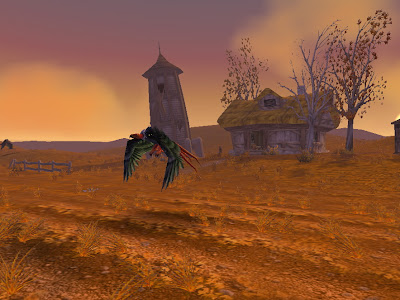
Nothing first seems terribly amiss in the golden fields of Westfall. The land easily earns its title of Stormwind’s breadbasket. With year-round warmth and moderate rain, it would be hard for crops not to grow. During times of war, Stormwind could always count on the farmers of Westfall to join the ranks in massive numbers, focusing their prodigious strength and endurance against the enemies of the kingdom.
Initial observation revealed that quite some time had passed since rain last fell on the plains. The grass is dry and yellowing, and the trees (predominately birches and elms) sickly. Even the best of climates experiences occasional downturns; Westfall has seen droughts come and go in the past.
I spent my first night in a nameless village situated in the sparse woodland near the river. It was too small to have a proper inn, so I made do with a stable. Once again, I had reason to rejoice at my weakened sense of smell.
A thick stillness enveloped the village, a quietude born of dread rather than languor. The locals sat in the shade, away from the glare of the sun that dried the life out of the surrounding fields.
“Most of the people here left for Elwynn already. We can’t keep up the farms on our own.”
The speaker was Gespin Adduson, an old man who’d worked as the local blacksmith for the past 25 years.
“I’ve heard there was a lot of violence in Westfall.”
Gespin looked at me for a long moment.
“You really don’t know do you? People in Elwynn and Stormwind are still asking that question? Light help us all,” he sighed.
“How did this start?” I asked.
“Damned if I know. It started in the south and just grew from there. This little corner is still pretty safe, though we spotted a few Defias bandits a week ago. That’s what they’re called: the Defias Brotherhood.”
“I’ve heard the name.”
“Believe me, a day or so beyond this point, you’ll start seeing their mark. We used to get a lot of folk coming up this way to get to Elwynn and they all had these terrible stories about massacres. Haven’t gotten any people in a while though. Probably everyone’s left already. Or they’re dead.”
The tone in his voice, one of cowed defeat, was familiar. I'd heard it before when Arthas led his army of damnation through Lordaeron, destroying everything in his path.
“What about Moonbrook?”
“I wouldn’t know. It’s a big town, so it’s probably able to take care of itself.”
“Do you plan to stay?”
“I’ll probably leave sooner or later. I gave my blood to get this land, back in the Second War. Both my brothers gave their lives. It’s a damn shame to abandon it. Mister Corestiam, I think it’d be wise if you went straight back to Elwynn. This is a country for the dead.”
Of course I went on, unmoved by Gespin’s warning. The land grows more sere away from the periphery. Miles of abandoned farmland stretch in every direction, weeds overtaking the fields and burying discarded plows.
Westfall was recently the most populous district in the entire nation. Even a small farm requires many people for upkeep. Yet I walked for two days without seeing a single person. In the middle of a warm and dusty night, I heard the baying of gnolls somewhere to the north.
I finally saw movement in the fields towards the end of the next day, the sun nearly set in a singed violet sky. Far away though I was, I could tell they were not human. Huge, shambling figures rampaged across the fields without purpose or aim. The crops were long gone, leaving nothing more than barren earth. I first thought it the work of ogres. Closer inspection revealed something much stranger.
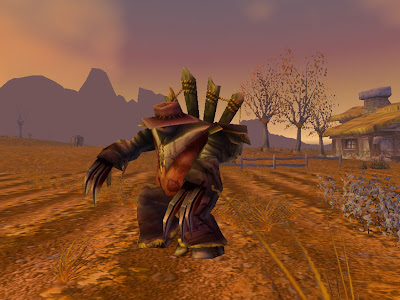
The figures were patchwork monstrosities of wood, iron, and burlap. Great claws, like scythe blades, hung heavily from their arms. They trundled across the landscape in erratic lurches, sometimes swiping those deadly claws at threats only they could see. I'd never seen anything like them. Gnomish inventions are usually all bright metal and glass; the grubby and tatterdemalion nature of the beings suggested goblin origin.
Not wanting to get close to the berserk machines I stood a safe distance from the fields, next to a burnt-out farmhouse. I could discern no pattern to their movements except that they did not seem to move beyond the boundaries of the field.
“Stranger, put your hands up in the air or you’ll be as dead as yesterday!” ordered a voice.
I raised my arms, keeping my eyes fixed on the scene below.
“I’m just a traveler.”
“And I’m just a farmer who can’t take any more chances. Turn around. Slowly.”
I obeyed. My assailant was a lean, middle-aged man with dark circles under his eyes, aiming a crossbow at my head. A haggard woman stood behind him, a rusty meat cleaver gripped in her bony hand.
“You don’t look like Defias.”
“I’m not.”
“You probably aren’t. That doesn’t matter. Turn around, and then you just walk to the road and go back to wherever it is you came from.”
“Careful, Furlbrow,” cautioned the woman.
“Everything is all right. Our friend here is about to go back on the road, right?”
With little recourse, I did as told. It was a relief when the farmhouse fell behind the horizon. I continued on the deteriorating road. I passed more fields occupied by the machines.
My first encounter with the Defias occurred the next day. The noon sun cast a relentless heat on Westfall, dusty air wavering over dry grass. On the road ahead I saw two figures resting in a gully by the side, a fire pit smoldering between them. Nearby, a tattered tent sagged on its struts. Red kerchiefs hung around their necks as they ate the meat of what appeared to be a coyote. They jumped up upon seeing me.
“Hey! You can’t have any!” one declared in a curiously high-pitched voice.
“I do not want any. I’m not hungry,” I said.
“Why aren’t you hungry?”
“I’m simply not hungry.”
“Where did you find the food then?” he demanded.
I got a better look at the Defias bandit. He could not have been much older than fourteen, and was unspeakably filthy. His scrawny frame was tensed, his hand hovering over the sheathed dagger at his side. His slightly older companion also readied himself. The latter kept near the roasted coyote, reluctant to stray too far from his paltry catch.
“He’s probably carrying food with him,” said the elder.
As fast as lightning, the younger bandit grabbed his knife and threw it. The blade embedded itself into my torso and I felt a tremor of dull pain. The bandit stood still for a moment, his face uncertain, perhaps confused at my failure to react. I unnerved him further by casually removing the dagger and tossing it. He took a few steps back.
“I am not hungry because my kind rarely needs to eat,” I growled. As he stared, I reached into my right socket and pulled out the glass eye, then doing the same for the left.
“By the Light! He’s a Scourge!”
“No! He’s one of the Venture drones, remember? Uh, we’re very sorry, sir. But you weren’t wearing the uniform”, explained the older bandit. “We were told that anyone not wearing the uniform out here was an enemy, so we were just following orders. It was Bardesen’s fault, he told us to do that.”
Surprised, I decided to play along.
“What is your name?” I asked.
“I am Censius Endremer. This is Gilson,” he said, pointing to the younger bandit, who was still staring at me with a look of terror.
“Drones don’t talk,” Gilson said.
Censius swung his fist at Gilson, knocking him down in the dust.
“Maybe this one can!” He took out his sword and held it over the prone Gilson. Censius looked at me, as if for permission, and I motioned him to back off. He did.
“Where are you from, Censius?”
“Sir?”
“Where are you from.”
“I was born in Menethil. Then one of the Defias people told me I could get good work down here, so I joined up. Gilson’s from Elwynn Forest.” Gilson was getting back up to his feet, his face clenched in pain.
“I see. Are you on duty here?”
“Yes. We’re always on duty, more or less.”
“What is your task specifically?”
“To make sure there aren’t any trespassers here.” He spoke as if he was uncertain. “We haven’t gotten any orders in a while, not since a month ago. We were following Bardesen’s orders, and he was selected as head of this region by the Commander himself.”
“You’ve been here all this time?”
“Not in this place. We’ve been around. Last week we were camped out at an old farmhouse with some other Defias, but the harvest golems killed some of them, so we left. What are you Venture people doing up here?”
“Simply observing.” I was at a disadvantage as I had never before heard of Venture.
“I see. We’re short on food. Do you have any?”
“You have food,” I said, pointing to the coyote.
“Right. Just asking.”
“How goes the efforts among the Defias?”
“Great. We’ve destroyed most of the royal presence here.”
“Royal presence?”
“The subjects of Stormwind. They aren't Defias, so Bardesen said that makes them royalty.”
“Do you have any objectives at this point?”
“We keep an eye on the place. Earlier we were clearing out the farms for our own use, but then they said that the threat from Stormwind was too great and we had to get back on war footing. That was two months ago.”
“I do not see much threat from Stormwind.”
“Oh, it’s there. I mean, royal spies could be anywhere.” As soon as he said that, his expression suddenly became suspicious.
“Stand down for now, I do—” I began.
“We can’t! We have orders to watch this place.”
“Now you have new orders.”
“Venture does not give orders to Defias,” yelled Gilson.
“That sounds like royalist talk,” accused Censius.
I fired off an arcane burst at the base of a nearby tree. The force of the magical explosion shattered the tree and a great chunk of it fell on their tent. I teleported through the two Defias immediately after the blast and emerged several yards ahead of them. They whirled around in alarm. I hoped that fear would win out over anger.
“Do not question my loyalties, cur. I’ve died once so I have no fear of dying again. Drop your weapons and lie on the ground.”
Censius put his cutlass to the ground and lay face down. Gilson did the same. I went over and picked up their abandoned weapons.
“Stay here until I am out of sight. I assure you that any attempt to hinder me on my journey will result in your death. And in the future, I would suggest that you avoid troubling the good men of Venture. Perhaps you’d be best off leaving the Defias.”
To be safe, I surrounded myself with a mana shield and went back on the road. Looking back some time later, I saw them with their faces still pressed into the dirt.
*********
The road turned south, leading to the town of Moonbrook. Moonbrook was once known as the Two-Fold City. The center of the town is located inland, while a port, effectively a separate town controlled by Moonbrook, is on the beach. Before the First War (during which the Horde razed Moonbrook to the ground) the port section dominated, a place infamous for the shady character of the inhabitants. The magistrate held office in the more sedate inland section.
Partially to avoid a similar morass of iniquity and vice, the new Moonbrook was designed with a port focused entirely on trade and labor rather than entertainment. Stormwind has long prided itself on its virtue and was eager to usher in a new era of civil planning. According to the blueprints, the port was to be small and compact. The laborers and merchants would actually live in small houses outside of the city.
Ultimately the plan seemed to have failed, though the last report I heard about Moonbrook was well before the Third War. The poorer laborers lived in shoddy barracks-style housing. The merchants, who disliked living away from their places of business, sometimes moved directly into the port. More often they simply departed for the inland town, which swelled in size and population.
I wondered if Moonbrook still survived. Something in the utter devastation of the land told me that it had met the same fate as the rest of Westfall. It is almost impossible to believe that Westfall is part of the same kingdom as Elwynn. The two regions are worlds apart.
A day into my southward journey brought me to carrion birds circling in the glaring noon sky. I found the cause when I reached the top of a small hill. A forest of sharpened stakes lined the road on both sides, bodies heaped in piles at the bases or skewered on the tips, the poles stained with gore from older bodies that had slid down to the earth. Vultures, ravens, and flies moved across the scene like a living black carpet as they gorged themselves on the dead.
Bellies swelled with decay, necrotic skin peeling from skeletal limbs, torn bodies thrown over older bones spread out in the human form. I focused on details, noticing the newer corpses still garbed in simple tunics and dresses of Westfall's farmers.
Someone had jammed a wooden signpost into the dry earth, “Death to the Enemies of Defias!” painted in black ink on the board. Beneath the scrawled warning I could see older words in a simple style, reading: Alexston Farmstead, 10 Miles.
I passed through as quickly as I could. I was struck with a dreadful epiphany. Many have voiced suspicions that the Defias are in league with dark forces, perhaps the Burning Legion or the Scourge. Personally, I do not believe this. Whether it is true or not is ultimately irrelevant. No demons or liches led that massacre. It was the work of humans. Even then it should not have come as a surprise. Human history is full of atrocities, and had been long before the orcs ever set foot on this sad world.
It became clear to me on that day that humans have no need of demons. I suspect that this is the same with all sentient races. Perhaps a universal Light does connect us all, as the theologians have long preached. However, they would agree that it takes effort to nurture goodness. The natural state of thinking races is to be ignorant of goodness. Any druid or hunter could tell you that nature is as savage as it is beautiful, and that mercy is an unknown quality among animals.
I suspect that all of the sentient races are inherently wicked, or at least have tendencies towards evil. The demons merely exploit dark traits that already exist within a race’s psyche. If goodness is the natural state, what need would there be for nations or gods or the Light? Many people, some of them quite wise and well-traveled, would disagree with me. Nonetheless, this is the only conclusion that I can believe. This is not to give excuses to those who do evil; rather, it makes it all the more important that we try to do good.
Physically and spiritually weary, I decided to visit the Longshore coast. Part of me hoped that the seaside air would cleanse my mind, which felt clogged with the detritus of cruelty. I went to the southwest, crossing miles of empty plains before reaching Longshore.
I stood on the windswept bluffs overlooking the beach. Beyond the thin strip of white sand lapped the waters of the Great Sea, the waves sharp and choppy from the wind. The sun was setting, and spread bloody rays across the darkening sky.
The beach was empty save for piles of driftwood scattered across the sand. I went down from the bluff to the water’s edge. Farther south I saw barnacle-infested wooden pylons sticking out from the sand, possibly the remains of a fishing village. An overturned rowboat lay next to the wreckage.
Then I heard a guttural choking sound. Hunched-over fish-figures emerged from the foaming waves near the ruins. Even after all its woes, Westfall was not spared the incursions of the murlocs. The beasts did not notice me, and gathered around the ruins croaking amongst themselves. I looked to the north and saw a silvery line move up the beach. It was another group of murlocs. I made haste to leave Longshore, not wishing to meet the creatures.
For two more days I traveled through devastated farmland, sent further into ruin by the rampaging harvesters. They seemed a fitting symbol for Westfall; destruction for its own sake. Whatever ideology that inspired the Defias was gone, replaced with a bleak and terrible nihilism.
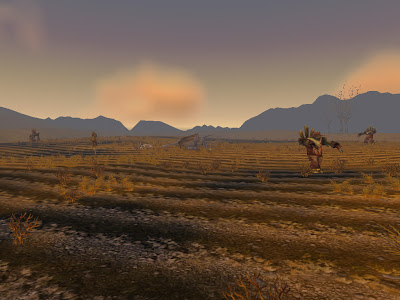
My hopes died the moment I saw Moonbrook. From a distance I could already tell that the Defias controlled the town. No royal defenses guarded the perimeter, and the buildings had fallen into various states of collapse. Staying low to the ground, I got closer to the occupied town. Red-masked Defias patrolled the streets. They were more disciplined and better-fed than the wretches I had encountered in the north.
A brightly painted red wagon with an attached crimson banner rolled through the avenues, pulled by a pair of scrawny mules. Five Defias soldiers sat inside, surrounding a young man who looked to be in his late adolescence. The youth shouted announcements and statements to the Defias on the streets.
“...to at last topple the kings that have so long been tyrants! Friends, we are making a new world, one of prosperity and strength! Even the Burning Legion cannot stand against us when we are united! We must be loyal! Loyalty is the word of the day, loyalty to the Defias cause and loyalty to Van Cleef! Commander Van Cleef is the one who knows the way! It is he who shall lead us into paradise! Greater blood than any thin noble blood flows through the Commander’s veins! Such blood flows in your bodies when you fight in the name of justice! Let there be a new human! Not controlled by frail and effete monarchs, but driven with the fire of unity, the strength of our ideology! The Defias are many, but we are also one! For the Defias! For Commander Van Cleef!”
He continued, shouting in his penetrating voice. The Defias soldiers cheered at the passage, their own cries of solidarity threatening to drown out the announcer. The speech was an old one; I had heard it before among the Scarlet Crusade, the Defilers, and the Dark Irons. I do not doubt that I will hear it again.
For the first time since I left the Plaguelands, I considered abandoning my quest. I had traveled far to find more lands twisted by hatred and war. Part of me wished to return to Undercity and never again leave, to lose myself in comforting memories of bitterness and resentment so that I no longer cared about the world.
I began walking east. My urge to return home aside, my plan was to reach Duskwood. In the distance I saw a small Defias encampment near a pool of stagnant water. Gunfire cracked in the humid air. The Defias thugs readied their weapons as a flight of arrows and bullets tore into them, felling at least five.
A motley crew of militia troops emerged from the tall grass on a hill, raining death on the Defias. The bandits returned fire but the element of surprise proved decisive. To show my intentions, I ran towards the camp and lashed out with arcane bolts, killing a Defias soldier.
I hurriedly placed the glass orbs in my eye sockets. Even as I did so, I wondered if my actions were so wise. The depredations the militia suffered could have brutalized them, as it had farmer Furlbrow to the north.
“Stay right where you are!” ordered one of the militiamen.
I did as he said.
“Are you out of Moonbrook? One of the farms?”
“I’m merely a traveler, from Lordaeron,” I shouted back. They were some distance from me.”
“You sure picked the wrong place to travel. Come here, we’re friendly.”
I gratefully walked to the assembled troops. They were a scrappy bunch, with makeshift armor and battered weapons. At the same time, they carried themselves like skilled fighters. Though they lacked the martial culture of Lakeshire, the crucible of civil war made them strong.
“I’m Sergeant Sallerton of the People’s Militia.”
“I am Talus Corestiam, a traveling mage.”
“A mage huh? You could be real useful around here. We’ve got a few spellslingers in Sentinel Hill, but the Defias probably has more. Come along then, we’ve got a long road ahead of us.”
*********
Even in times of peace, a wise nation does not forget about security. Perhaps the building of a keep in east-central Westfall seemed overzealous during the peaceful times of its construction. Few would now object to it. As it turned out, Moonbrook lacked any real defensive capability and had actually been abandoned rather than conquered. The townsfolk and many of the farmers gathered around the solitary tower for protection.
The encampment of Sentinel Hill is a collection of dusty wooden buildings in one of the more forested parts of Westfall. A lumber mill stands there, having been built some time before the Defias uprising. Today, it is a workshop where the militia's tools and weapons are made. The central tower is admittedly a rather scant form of defense but it at least allows Sentinel Hill's defenders to see incoming threats.
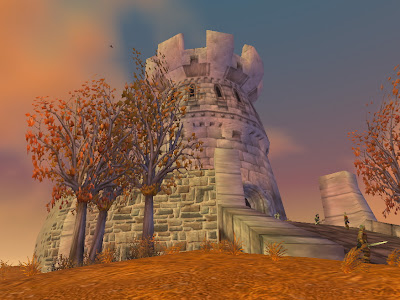
The People’s Militia is obviously a reaction to the Defias Brotherhood. Led by trained soldiers and war veterans, they gathered the dispossessed people of Westfall and turned them into a reasonably effective fighting force. The fiercest battle is for resources. Though some of the farms near Sentinel Hill still produce food, sustenance is always in short supply. A few of the farming villages along Elwynn River send grain to the beleaguered People’s Militia. Not all of the Stormwinders have forgotten Westfall, even if the government has stopped caring. The king’s lack of action serves to partially justify the Defias ideology.
“We had problems with the harvest golems even before those bastards starting looting everything in sight.”
I was speaking with Edna Lennos, a tough but worn woman from the northern reaches. The Defias had murdered her husband, and she guided her two surviving children to Sentinel Hill.
“What exactly happened with those?”
“At first they seemed like a true blessing. Something to make the harvest light as a feather. We figured those thing would spread all over the world. Out on the field though, they kept breaking down or trampling crops. Some of my neighbors did the smart thing and burned them. We were considering it when they just went crazy.”
“Was it very sudden?”
“Oh, you bet it was. First, we thought it was some other problem. Silas, one of the farmhands, went over to take a look and the thing tore him wide open. We couldn’t go into the fields after that, and we found out that the same thing had happened all over. On the Molsen farm the harvest golems killed the entire family.”
I asked about the Venture group I had heard of while speaking with the Defias. I finally got an answer from a dwarven merchant whose riverboat had been seized by Defias operatives. He explained that the Venture Company is a goblin organization, but he knew little beyond that. I also informed the authorities in the People’s Militia. None of them knew what services the Venture Company provided for the Defias, but nearly everyone concluded they were behind the harvest golems.
The battle to maintain morale is another vital front. The man leading this effort was Torsen Velsemin. Torsen was a giant of a man possessed with a commanding presence. He looked like the popular images of Olorius, the rugged missionary who first brought the Light to Stromgarde. Torsen is the spiritual leader of Westfall, bringing hope to the tired populace.
“Then you have confidence that the Defias will be defeated?”
“If I did not have faith I would not be here. One thing I’ve learned is that there’s no Light among the Defias. They are a mean and deplorable bunch, as cruel to each other as they are to the farmers of this land.”
“They lack unity?”
“No, not quite. But when you have a society where people are freely vicious to each other, it has a bad effect. Even if they are fanatics that work together, it eats away at them from the inside. With or without us I believe they will eventually collapse on their own.”
“I can easily believe that. The Defias seem to be a house of cards. I’m happy to see that at least there is resistance to them, and I salute the bravery of you and the people here.”
“A good friend of mine once said that the night is darkest just before dawn. I think that’s the case here. You’re from Lordaeron, correct?”
“I am.”
“Do you know of the Argent Dawn?” he asked.
“I do, in fact I spent some time at Light’s Hope Chapel.”
“Is that the new place they have in the Eastern Plaguelands? I only spoke with the ones at Chillwind Camp.”
“Yes, it is.”
“I’m not officially a member of the Argent Dawn but they are some of the best people on this world. I don’t want to sound too proud, but I like to think of myself as bringing the Argent Dawn down here to Westfall.”
“This place sorely needs it. When do you see the war ending?”
“I’ll pray for it to end soon and I’ll prepare for it to not end in my lifetime. It is very important to remind the people here of the Light that binds us. We cannot descend to the level of viciousness you see in the Defias. Make no mistake, we will fight! Oh, we will fight, and we will kill. I’ve killed plenty of Defias in my time here. Yet I must make sure that it is done for justice, not vengeance.”
“An admirable sentiment.”
“I won’t lie to you Talus. Sometimes I too want vengeance. I’ve seen terrible things here, whole families and villages massacred without a second thought! What man wouldn’t want to strike back as ferociously as he could?”
He sighed deeply and then continued.
“When I think that, I must remember my brethren in the north. My hatred could carry over to them, to everyone living. It won’t do too much, but in a time when there is so much evil in the world it can add up. Maybe some humans can’t live up to the Light; maybe most of us can’t. But the second we stop trying we will have monsters like the Defias or the Scarlet Crusade bringing more misery to this world.”
I admired for Torsen’s faith, and hearing him speak helped bolster my own. Still, as he said, his belief in the Light was not enough to win the war by itself. A mile north of Sentinel Hill is a grove of elms from which hang the corpses of Defias rebels. It is a macabre tableaux, but war is by nature an awful thing, and necessity cannot change that fact.
I arrived on the sacred holiday of Lightrise, commemorating the day when Cassian converted King Telean Menethil II to the Light. Lightrise was always an important holiday, and I was a bit saddened to realize I had completely forgotten about it.
The people of Sentinel Hill gathered near the tower at sunset. Even in such an important occasion, soldiers of the militia continued to keep watch on the horizons. Leading the ceremonies was Torsen, whose booming, godlike voice filled the air. Torches glowed in the descending dark, symbolizing the enduring power of the Light. Wildfires are a very real risk in much of Westfall, but the region around Sentinel Hill has not been so ravaged by drought.
Dusk turned to night and Torsen reiterated many of the points he had made in our conversation. The Defias who brought strife to the people had to be struck down but those who asked for mercy had to be spared and taught. Other speeches were made and hymns were sung. There was an amazing vitality in the crowd of worshippers, faith surging from them like arcane energy from a leyline. At midnight, the torches were snuffed out, one by one. In the darkness, Torsen again spoke of the need for faith during hard times, his voice soft and reflective. He led the pious refugees in a slow, hopeful song. At the last note, one of the torches sprang back to life, followed by another, and another. Soon all were alight, fighting the darkness.
I stayed in Sentinel Hill for a week, doing what I could to help the People’s Militia. The materials for my disguise were growing scarce, so I knew I could not stay too long. The People’s Militia needed help so badly that it’s entirely possible that they might have accepted me as a Forsaken. I chose not to risk it. On two occasions I accompanied militia patrols; in the first we ended up fighting a small gang of gnolls. Fortunately, we did not suffer casualties.
Towards the end of my stay I met with a former Defias brigand named Ondor Karelsen. Ondor was a somber man, quite young, who had escaped from the Defias and offered to help the militia. We met in one of the barracks structures in which many of the inhabitants lived.
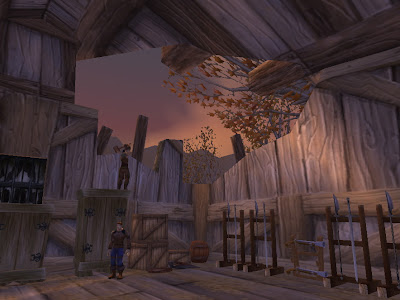
“I was born in Stormwind City. I am not of noble birth, though my family was well-off.”
“What motivated you to join the Defias?” I asked.
“Defias recruiters can be found everywhere. They give all of their high-minded talk about justice and a new society, and it worked on me. I joined with a few of my friends. We were all students with a good deal of money and very little direction. The recruiters said we should meet with their people in Moonbrook, so we followed them to Westfall.”
“What was Westfall like at the time?”
“This was two or three years ago, so things hadn’t gotten too bad yet.”
“So you weren’t able to determine the Defias’ aims.”
“I suppose not. When we got to Moonbrook they blindfolded us and marched us underground. They use the Deadmines as their headquarters. We didn’t get any food and water for a long time after that. I don’t remember how long.”
He paused, collecting himself.
“All that time senior Defias would yell at us, accusing us of all sorts of things. I suppose we were cowed into submission. Eventually we were swearing oaths to the Defias Way and to Commander Van Cleef.”
“Did you ever see Van Cleef?”
“Twice. He gave some speeches to us; the man can bind nations with his voice and words. Looking back on it I don’t know how they made us so loyal. We should have hated them, yet we didn’t. It’s very confusing. Excuse me, I need to drink something.”
Ondor stood up from his chair and picked up an earthen jug filled with water. He took a deep swig, and closed his eyes.
“If you don’t want to continue—”
“I’m fine. At the time there weren’t really that many of us. They took us out of the Deadmines, blindfolded again, and over to some compound in the Dagger Hills. We must have spent at least a few months being trained.”
“How to fight?”
“No, how to think, or rather how not to think. We did get some combat training but not very much. One of my friends had been studying as a mage, and he rose very quickly in the ranks. The rest of us stayed where we were. We were always working, always in the company of a Defias officer.”
“Did more join you over time?”
“Yes, though not all of them received the same indoctrination. Many of them were simple gangs of thieves and highwaymen. It grew from there. A good deal were refugees from Lordaeron, desperate and ignorant. The Defias Brotherhood became our whole world. Eventually we were marched to a quarry in the north. For quite a while we stood there at guard. Shady characters went in and out of the quarry.”
“Did you ever hear of a Venture Company?”
“Actually, no. I did see a few goblins but I did not ask what they were doing there. Defias aren’t supposed to ask questions. Usually I was too tired to think very clearly. Eventually, after about a year or so, they made us participate in farm raids. My mind was so battered at that point I did not think to question it.”
“What finally made you leave the Defias?”
“We did terrible things. At first I was in the sidelines of the attacks, but because I was educated and somewhat articulate, they soon had me doing interrogations. A few times I worked to coerce people into joining the Defias. I did this willingly at the beginning, thinking I was making the world a better place. Then I, well, I realized something. I had to escape, better that I die than do anything like that again. I found a home here.”
“You did the right thing, and at least you are working towards redemption.”
“I don’t intend to survive this conflict. I can’t go back to Stormwind City, I can barely stand looking in the eyes of the people here. It was Torsen’s mercy that saved me. There are those in Sentinel Hill who want to kill me and I can scarcely blame them for it. Tell me, do the people in Stormwind City know of this? Of the Defias?”
“Only vaguely,” I replied. “They don’t seem to view it as more than a minor insurrection.”
“We’ve sent some of our most persuasive speakers to convince them of the threat but they never succeed. The Noble’s Council is full of Defias, we’re all sure of it. Some of the Westfall refugees in Stormwind City and Elwynn have been trying to petition for help but there has been no response. They’ve been becoming more vocal at least, so maybe they will eventually have success.”
During my last day in Sentinel Hill, I stood outside the tower and watched the sunset. I hoped that the Royal Army would realize the problem and send troops to quell the Defias. It seemed doubtful that they would, and I also had to wonder if the Royal Army had ever arrived at Lakeshire. As bad as the Old Horde was, Redridge was much better off than Westfall, where civilization itself hovered at death’s door.
Duskwood loomed ahead in my future, and the tales I heard of it were not reassuring. The People’s Militia spoke of haunted towns and a dark curse that seeped into the very earth. No matter what horrors lay in wait, it was the next part of my journey, and I would go ever onward.
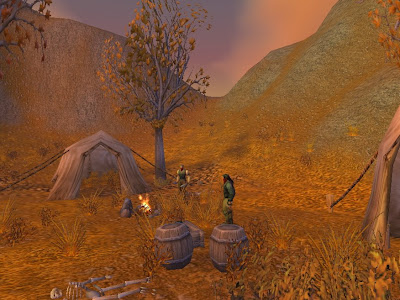
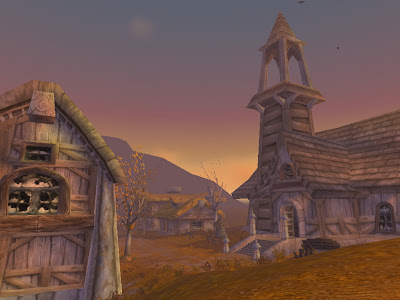
Ouch. Interesting contemplations in this one, the whole cult-indoctrination-story was unexpectedly... realistic. So yeah, the... ramifications of "Lady Prestor"'s sabotage/distracting, I guess...
ReplyDeleteThis is a really good fic. All the talk I heard about it being god-tier was not exxagerrated.
Thank you.
ReplyDeleteCan I ask how you go about creating these side characters that Destron meets along his journey? How do you develop those characters? They are all so believable and add incredible flavor to each zone.
ReplyDeleteAw, thanks! A lot of it was just imagining what kinds of people would live in these places. I always tried to look at Azeroth through the perspective of regular people (who, in my opinion, can be more interesting than the great heroes). Plus, I drew from history, literature, people I've met IRL, and so forth.
DeleteSorry I'm writing this so late. I only just got notice about comments from the past few years.
The only complaint I have is not really having heard the Defias firebrand perspective. Such extremist groups are usually held together by more than coertion. You nailed the part where they would have "ideological education" upon joining which gave me communist guerilla sort of vibe (where political commisars and educators were more important to the unit than commanders) but you missed other traits of such groups like unity, comaraderie and fanaticism and belief to their ideas to a fault. Communist partisans in say Yugoslavia or USSR during ww2 were absolutely brutal towards their ideological opponents not straying from killing innocents, prone to purging their own ranks but at the same time after reading diaries of several notable fighters most of them had nearly religious devotion to the cause and believed themselves to be a force of good. For example when they took a village they would brutally exterminate landowners and well off citizens as capitalists but they would also try to educate (brainwash) peasants by giving them more perspective in life through openning schools, increasing literacy, openning hospitals etc. Westfall could have been a land torn apart by civil war with many peasants supporting and hiding revolutionaries and them waging war only on those deemed as "class traitors". Similarly in Elwynn they could have had hidden supporters among youth of Goldshire and Northshire just like communists attracted youths.
ReplyDeleteUnlike the Syndicate and Scarlet Crusade in the game itself Defias were portrayed with far more shades of grey and actual legitimate complaints driving them. Add to that probable Westfallian separatism or something and I could see why youths of Westfall and lower layers of Elwynn would join them in the struggle against what they saw as inept central government, burgeoise and nobles. Of course I'm not either Defias nor Communist supporter and you should definately not shy away from their missdeeds but I think tad bit of complexity would have been nice. Onwards to Duskwood.
I heard a story from someone who'd talked to a Yugoslavian who'd survived World War 2. Basically, that when the communists came to a village, they would check everyone's hands. People whose hands lacked calluses were taken out and shot, since that indicated they weren't workers. The story has stuck with me.
DeleteYou're right that the Defias did have a legitimate grievance. That said, a lot of really horrific groups in history did start with legitimate grievances. The Defias simply took that dark road too far. But yeah, I probably should have explored this further.